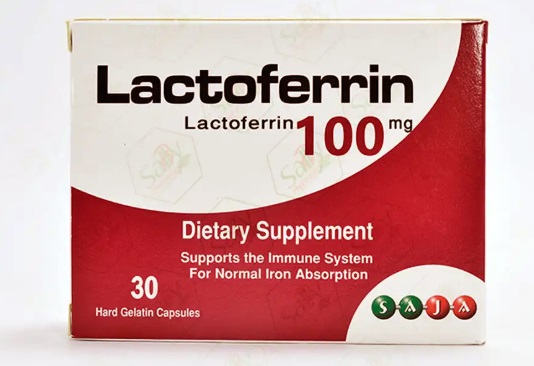Lactoferrin and Its Promising Role in Combating Neuroinflammation and Promoting Neuronal Health
Nikhil Prasad Fact checked by:Thailand Medical News Team Jan 13, 2025 3 months, 7 hours, 17 minutes ago
Medical News: Researchers from the University of Bari, University of Salento, IRCCS Istituto Tumori Giovanni Paolo II, and the University of Foggia have uncovered fascinating insights into the role of lactoferrin, a naturally occurring glycoprotein, in managing neuroinflammation and promoting neuronal regeneration. Neurodegenerative diseases, such as Alzheimer’s and Parkinson’s, are characterized by the progressive loss of neurons and persistent inflammation.
 Lactoferrin and Its Promising Role in Combating Neuroinflammation and Promoting Neuronal Health
Lactoferrin and Its Promising Role in Combating Neuroinflammation and Promoting Neuronal Health
With limited regenerative capacity in the brain, the discovery of lactoferrin’s capabilities opens new possibilities for addressing these debilitating conditions.
Lactoferrin, found in bodily fluids like saliva, tears, and milk, possesses a range of properties - anti-inflammatory, antibacterial, antioxidant, and immunomodulatory.
The researchers explored its ability to attenuate inflammation and reprogram astrocytes, the brain’s supportive glial cells, into neurons. This
Medical News report delves into the findings of the study, revealing the intricate processes through which lactoferrin holds promise as a therapeutic agent.
The Role of Astrocytes and the Problem of Neuroinflammation
Astrocytes are essential components of the central nervous system, providing structural and metabolic support to neurons. In the presence of neuroinflammation, however, these cells can become reactive, releasing pro-inflammatory markers and hindering recovery. This inflammatory environment not only exacerbates neuronal damage but also restricts the brain’s already limited regenerative capabilities.
To better understand the potential of lactoferrin in modulating these effects, researchers used a model of chronic inflammation induced by lipopolysaccharides (LPS) in astrocytes. By pre-treating the cells with lactoferrin, they observed significant changes in the behavior of these reactive astrocytes.
Key Findings of the Study
-Anti-Inflammatory Effects
One of the standout observations was lactoferrin’s ability to reduce the expression of pro-inflammatory markers. Toll-like receptor 4 (TLR4) and glial fibrillary acidic protein (GFAP), indicators of astrocyte reactivity, were significantly downregulated after lactoferrin treatment. Concurrently, lactoferrin enhanced the expression of interleukin-10 (IL-10), an anti-inflammatory cytokine, and NRF2, a transcription factor known for its antioxidant properties. These effects collectively reduced the inflammatory profile of the astrocytes.
-Induction of Neuronal Reprogramming
The study also demonstrated that lactoferrin promotes the reprogramming of reactive astrocytes into proliferative neuroblasts. Key to this process was the upregulation of SOX2, a transcription factor crucial for neuronal lineage conversion. Astrocytes treated with lactoferrin showed increased pr
oliferation rates and the expression of doublecortin (DCX), a marker of neuroblast formation.
Over time, these neuroblasts began expressing TUJ-1, an early marker of post-mitotic neurons, suggesting successful progression toward neuronal differentiation.
-Reduction of Astrocytic Markers
Another critical observation was the reduction of astrocytic identity markers in lactoferrin-treated cells. GFAP and S100β, proteins associated with the astrocyte phenotype, were markedly decreased, indicating a shift from an astrocytic to a neuronal identity. This transition is essential for ensuring the successful integration of new neurons into existing neural circuits.
-Morphological Changes and Functional Indicators
In addition to molecular markers, researchers observed morphological changes in lactoferrin-treated astrocytes. Cells began adopting a neuron-like structure, with elongated processes extending from the cell body. Immunofluorescence analyses further confirmed the presence of neuronal markers such as Neurofilament 68 (NF) and NeuN, reinforcing the evidence of successful reprogramming.
Implications for Neurodegenerative Diseases
Neurodegenerative diseases pose significant challenges due to their complex pathology and the lack of effective treatments. Current therapies focus primarily on symptom management rather than addressing the root causes of neuronal loss. The dual action of lactoferrin - its anti-inflammatory properties and its ability to induce neuronal regeneration - positions it as a promising candidate for future therapeutic strategies.
This study highlights the potential of combining anti-inflammatory treatments with cell reprogramming techniques to restore neuronal populations. By reducing the inflammatory environment and directly reprogramming astrocytes into neurons, lactoferrin could pave the way for innovative interventions in conditions like Alzheimer’s and Parkinson’s.
Challenges and Future Directions
Despite its promising results, the study acknowledges several limitations. The experiments were conducted in vitro, meaning the findings need validation in animal models to confirm their applicability in living organisms. Additionally, the long-term survival and functional integration of the reprogrammed neurons remain critical questions that require further exploration.
Another aspect to consider is the potential for tumorigenicity, as the overexpression of SOX2 has been linked to certain cancers. However, the study found that lactoferrin-treated astrocytes exhibited distinct growth patterns compared to glioblastoma cells, suggesting a lower risk of tumor formation. Nonetheless, this aspect warrants further investigation to ensure safety in potential clinical applications.
Conclusion
Lactoferrin emerges from this study as a multifunctional agent with the potential to address both neuroinflammation and neuronal loss. Its ability to reprogram astrocytes into neuronal precursors, coupled with its anti-inflammatory effects, offers a novel approach to tackling the challenges of neurodegenerative diseases.
While further research is needed to validate these findings in vivo and to refine the therapeutic protocols, the groundwork laid by this study is a significant step forward.
The study findings were published in the peer-reviewed International Journal of Molecular Sciences.
https://www.mdpi.com/1422-0067/26/1/405
For the latest on Neuroinflammation, keep on logging to Thailand
Medical News.
Read Also:
https://www.thailandmedical.news/news/the-phytochemical-honokiol-from-the-magnolia-tree-combats-neuroinflammation-and-brain-aging
https://www.thailandmedical.news/news/neuroinflammation-and-new-strategies-for-brain-health
https://www.thailandmedical.news/news/neuroinflammation-in-the-brainstem-and-its-link-to-pots-and-long-covid
